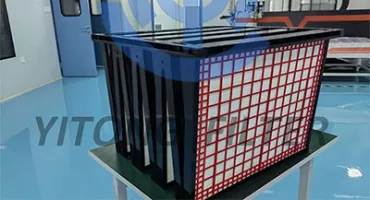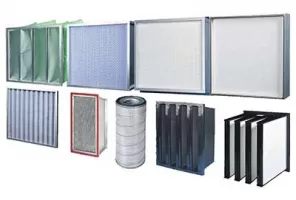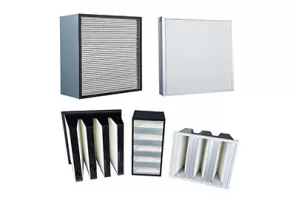 March 01, 2024
March 01, 2024
In today's world, where indoor air quality (IAQ) is of paramount concern, HVAC HEPA filters stand as essential components in maintaining clean and healthy indoor environments. HVAC, an acronym for Heating, Ventilation, and Air Conditioning, plays a crucial role in regulating indoor temperatures and air quality. Within HVAC systems, High-Efficiency Particulate Air (HEPA) filters serve as powerful allies in trapping airborne contaminants and ensuring occupants breathe clean air.
What are HVAC HEPA Filters?
HVAC HEPA filters are advanced filtration systems designed to capture a wide range of airborne particles, including dust, pollen, mold spores, pet dander, bacteria, and even viruses. Unlike standard HVAC filters, which primarily target larger particles, HEPA filters are capable of trapping particles as small as 0.3 microns with an efficiency rating of 99.97%.
How Do HVAC HEPA Filters Work?
The effectiveness of HEPA filters lies in their dense fiber composition. These filters typically consist of randomly arranged fibers made from materials like fiberglass. As air passes through the filter, particles are captured through a combination of mechanisms including interception, impaction, and diffusion. This intricate process ensures that even the smallest particles are trapped within the filter, preventing them from circulating back into the indoor air.
Benefits of HVAC HEPA Filters
Improved Indoor Air Quality: By efficiently removing airborne contaminants, HVAC HEPA filters help create a healthier indoor environment, especially for individuals with allergies, asthma, or respiratory issues.
Reduced Allergens: HEPA filters are highly effective at capturing allergens such as pollen, dust mites, and pet dander, reducing allergic reactions and respiratory symptoms.
Enhanced HVAC System Performance: By preventing dust and debris buildup within the HVAC system, HEPA filters can improve system efficiency and longevity, leading to lower maintenance costs and energy savings.
Protection Against Airborne Pathogens: In addition to allergens, HEPA filters also capture bacteria and viruses, mitigating the risk of airborne transmission of illnesses.
Cleaner Living Environment: Cleaner air not only benefits human health but also helps maintain a cleaner living space by reducing dust accumulation on surfaces and furnishings.
Considerations When Choosing HVAC HEPA Filters
Filter Efficiency: Look for HEPA filters with a minimum efficiency rating of 99.97% for particles as small as 0.3 microns to ensure optimal performance.
Compatibility: Ensure the HEPA filter is compatible with your HVAC system's specifications to guarantee proper installation and functionality.
Filter Replacement: Regularly replace HEPA filters according to manufacturer recommendations to maintain peak performance and prevent airflow restrictions.
Cost vs. Benefit: While HEPA filters may have a higher initial cost compared to standard filters, the long-term benefits in terms of improved indoor air quality and system efficiency outweigh the investment.
Conclusion
In conclusion, HVAC HEPA filters play a crucial role in safeguarding indoor air quality and promoting occupant health and comfort. By efficiently capturing airborne contaminants, these advanced filtration systems contribute to cleaner, healthier indoor environments and ensure the optimal performance of HVAC systems. Whether in residential, commercial, or industrial settings, investing in high-quality HEPA filters is a proactive measure towards creating a safer and more comfortable indoor space for all occupants.
 Nov. 17, 2023
The Application of HEPA Filters in Gas Turbines
Nov. 17, 2023
The Application of HEPA Filters in Gas Turbines
 Dec. 18, 2024
Industrial Air Filters: A Comprehensive Analysis of Their Functions and Applications
Dec. 18, 2024
Industrial Air Filters: A Comprehensive Analysis of Their Functions and Applications
 Apr. 24, 2024
What is a HEPA Filter and How Does it Work?
Apr. 24, 2024
What is a HEPA Filter and How Does it Work?

